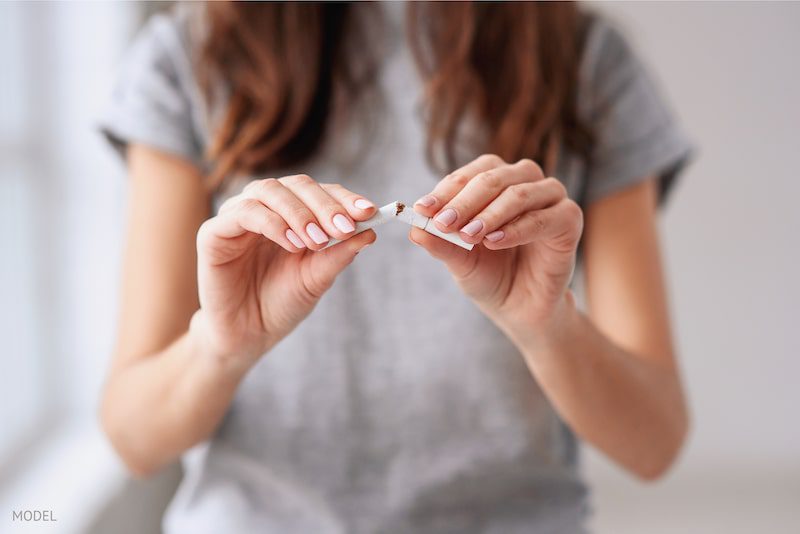Facelift, Plastic Surgery Safety, Tummy Tuck | The Office of Dr. Vincent Hung
3 Minute Read:
When planning for plastic surgery, one of the requirements almost every board-certified plastic surgeon will mandate is that patients refrain from using all nicotine products for three to six weeks before and after surgery.

There are very good reasons for this near-universal stricture. Nicotine and other chemicals found within cigarettes damage the lungs, yellow the teeth, and age skin, but these factors are unlikely to directly impact plastic surgery operations. What will affect these procedures is nicotine’s vasoconstriction effects.
What Are the Effects of Nicotine on Your Body?
Nicotine causes veins and arteries to contract, restricting the amount of blood that can pass through them. This dramatically increases the risk of complications during surgeries, especially plastic surgeries that affect a broad area of surface tissue like facelift surgery (rhytidectomy) or tummy tuck surgery (abdominoplasty). When a plastic surgeon removes a section of tissue on the surface, it is kept alive through blood vessels in nearby tissue. If a patient has nicotine in their system, these blood vessels are too constricted to provide adequate blood flow.
This means that patients who do not stop smoking are at a much higher risk of tissue necrosis during plastic surgery.
What Is Tissue Necrosis?
Tissue necrosis is when tissues die while still attached to the body. This condition can be dangerous and, in some cases, lead to gangrene—a potentially lethal condition. The effects of nicotine and the risks of tissue necrosis do not go away during the recovery period. Even if patients who smoke make it through the surgery without complications, there is still a higher risk of tissue necrosis and excessive scarring during recovery.
What Are Other Smoking Risks?
- In addition to the vasoconstriction effects, smoking also decreases blood’s ability to carry oxygen by adding carbon monoxide to the bloodstream. This increases the risks mentioned above.
- Nicotine inhibits collagen production, causing the skin to age faster and heal slower. This can make recovery times longer and increase the risk of complications.
- Smoking can increase the risk of certain skin cancers, such as basal cell carcinoma and melanoma.
- Smoking also causes wrinkles and other skin concerns that are difficult to reverse while toxic chemicals continue to do more damage.
How Should I Prepare for Surgery?
If you plan to undergo a plastic surgery procedure, it is vital that you honestly discuss your smoking habits with your surgeon. You should have a frank discussion about your ability to refrain from smoking before and after your operation.
It is critical that you do not lie to your surgeon about your nicotine consumption, as this may endanger you.
If you truly feel unable to quit smoking for at least 12 weeks, you should not undergo surgery. If, for any reason, you consume nicotine during that window (before or after your surgery), you should contact your surgeon right away.
Want to Learn More?
If you are interested in more information on the risks of smoking regarding your plastic surgery procedure, please contact Dr. Hung at his Pasadena office at 626-432-5032 or his Newport Beach office at 949-574-8292.
